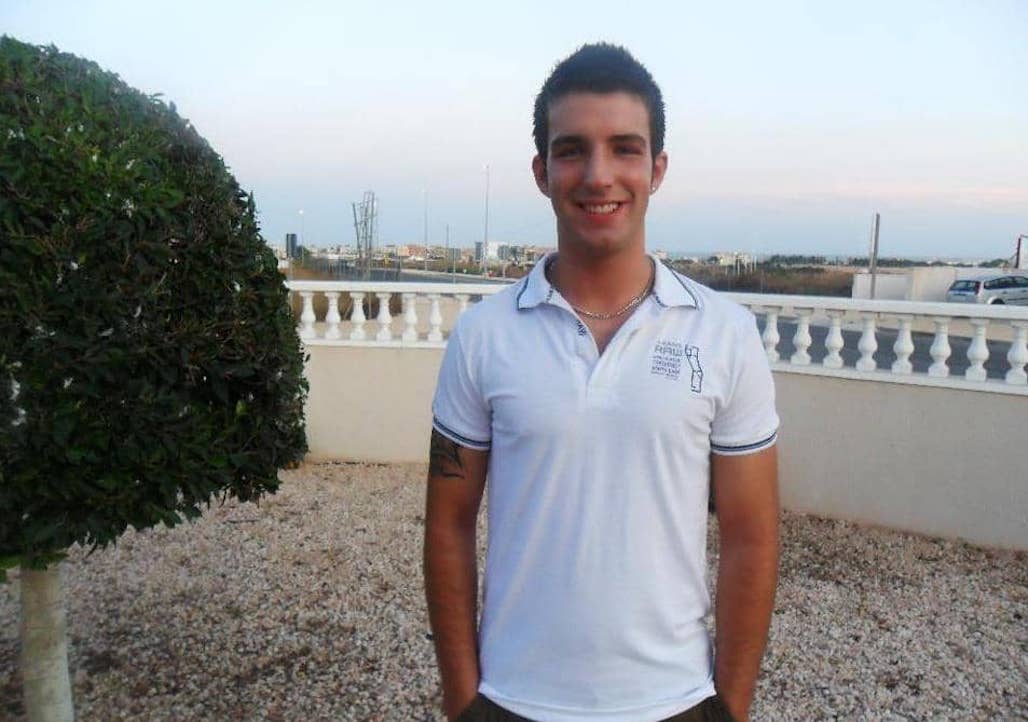
The grieving family of a young Armagh man who died after a routine ear operation say they have failed to find closure after the conclusion of an inquest into his untimely death.
Peter McAneney was just 20 when he passed away suddenly on May 10, 2012, just weeks after surgery at Craigavon Area Hospital.
His family’s heartbreaking seven-and-a-half-year wait finally came to a conclusion today (Thursday), with the coroners verdict being delivered at Armagh Courthouse.
Peter’s mum Jennifer said the waiting had been “torture”, while a solicitor for the family said they had not been granted closure by the coroner’s ruling at the end of all those years.
Coroner Suzanne Anderson said that Peter, who had a longstanding ear problem, had a planned mastoidectomy at ENT (Ear, Nose & Throat) Clinic at Craigavon Area Hospital on April 20, 2012.
During this a 2mm titanium prosthesis was placed within his ear.
Coroner Anderson said: “This was not mentioned on the consent form which Peter signed but I am satisfied this had no bearing on his death.”
Peter’s ear was then fitted with a BIPP (iodine paste) pack; reactions to this are uncommon but hypersensitivity is possible if used more than once and this was Peter’s third operation.
His ear then became red, swollen and had a yellowish discharge.
On April 25, at 10.02am, Peter was admitted to ENT at Craigavon Area Hospital.
Part of the BIPP was removed and Peter was put on two IV antibiotics to treat what was believed to be a reaction to the Iodoform component of the packing.
A swab was also taken on Peter’s ear, the results of which were obtained on April 27 at 9.01am and showed infection.
However, hospital notes on the morning of April 27 read: “Check swab – no growth”.
Coroner Anderson stated this should have been noted: “Check swab – result not yet available.”
It was believed Peter was suffering an infection and allergic reaction so he was released on April 27 with medication.
On May 2, Peter was reviewed by the ENT surgeon, who had carried out his surgery; his attention was drawn to a rash which Peter had on his hands.
The BIPP was removed three weeks earlier than planned and Peter was given steroids to deal with an allergic reaction to the iodine.
Coroner Anderson said: “I am satisfied there is no evidence that Peter was allergic to iodine as it is naturally in the body.
“I agree with the expert who said the inflammation was likely caused by a combination of a hypersensitivity reaction and an infection.”
On May 5, Peter experienced chest pains and shortness of breath whilst playing football and the following day he attended the out-of-hours GP.
From there he was taken to the emergency department of Craigavon Area Hospital at 12.03am.
Peter complained of feeling nauseous and reported that he had vomited twice. It had been noted his temperature was slightly elevated.
After it was established that Peter had fluid around his heart he was transferred to the cardiology ward.
On May 8, a consultant cardiologist diagnosed Peter with myocarditis which was to be treated by monitoring and supporting Peter’s body.
After contacting the Mater Hospital, doctors were informed that due to Peter having a titanium prosthesis he could not have an MRI scan.
Coroner Anderson said: “The evidence shows that this was incorrect but steps have been taken to improve learning and the absence of an MRI did not cause or lead to Peter’s death.”
On May 9, the cardiologist consultant informed the family that there was fluid around Peter’s heart but he did not want to remove the fluid as there needed to be a certain amount for it to be operated on.
Specialists at the Royal Victoria Hospital (RVH) were contacted for advice but there was no response.
Coroner Anderson said: “The system of contact has now been improved, the absence of discussion did not cause or contribute to Peter’s death.
“The RVH had not asked for him to be immediately transferred and there would not have been sufficient time given the sudden nature of his collapse.”
In the early hours of May 10, Peter’s blood oxygen levels were dropping and a doctor was called immediately as there were concerns he needed respiratory support.
After being taken to ICU, Peter’s blood oxygen levels remained low despite the use of a mask.
The decision was taken to put Peter ‘under’ in order to pass a breathing tube down his throat.
It was discovered that there was fluid in Peter’s lungs as this appeared in the breathing tube.
At 7.45am, Peter then went into cardiac arrest but was successfully resuscitated after approximately five minutes.
The doctor then performed the surgery to remove fluid around Peter’s heart, however, once more he went into cardiac arrest.
Peter was pronounced dead at 9.22am.
Coroner Anderson said: “I accept that Peter’s death was exceptionally sudden. His youth and fitness enabled his body to compensate until the heart could take no more.
“This was a sudden and unexpected collapse with catastrophic results.”
She commented that this was an “extremely rare” condition which was triggered by infection and allergic reaction to antibiotics.
Coroner Anderson acknowledged that there had been failures by nurses to keep accurate notes on Peter’s condition.
However, she said: “Up until 3am Peter was systemically stable. He would not have been transferred to any ICU or tertiary centre.”
Coroner Anderson concluded: “It was very apparent throughout how well thought of Peter was by his mother, father, sister and family.
“My deepest sympathy goes out to Peter’s mother, father, sister and extended family members.”
Jennifer McAneney responded: “I would like to thank you for your time and the staff. The last seven-and-a-half years have been torture.
“This is met with relief, albeit the coroner’s inquest did not answer all the questions we had. It is all too late for us but we do hope it will benefit the public.”
Speaking to Armagh I, following the verdict, Jennifer said: “We will embrace the journey going forward and try to find peace.
“The inquest was not the venue through which we will get the answers and we will never truly get over the death of Peter. He is always with us.”
The family’s solicitor, Paul Haughey, told Armagh I the family had been left “disappointed” by the findings of the Coroner’s Court.
“The family are aware of the function the Coroner’s Court plays and are aware its purpose is different from the role of a Judge in a Civil Court.
“However, the family had hoped the coroner’s decision would have contained a more detailed and meaningful analysis of the evidence of the experts that was presented to the Coroner’s Court over the duration of one week.”
He added: “The family believe this was absent in the decision and the decision in essence recounted Peter’s journey as outlined by them to the Coroner.
“The decision has not assisted the family in seeking the closure it had hoped for.”




